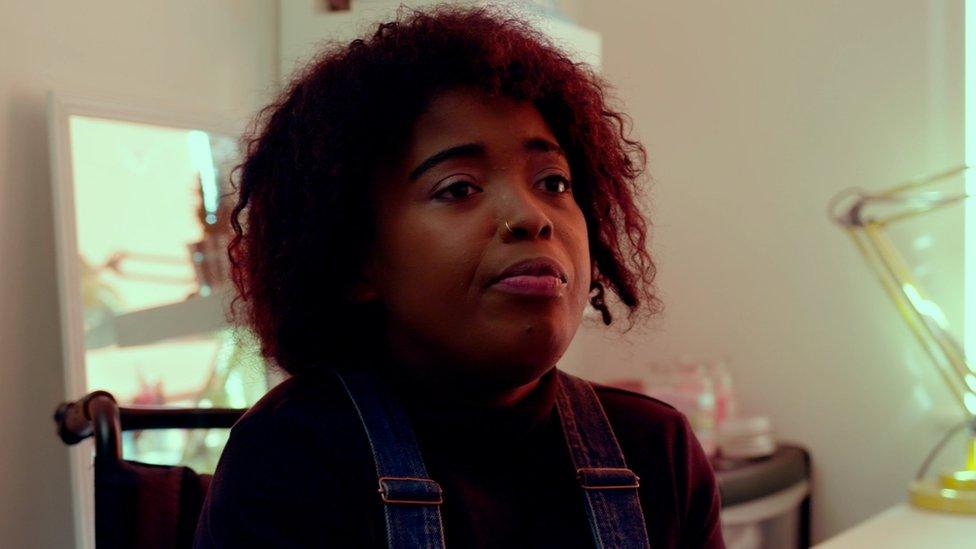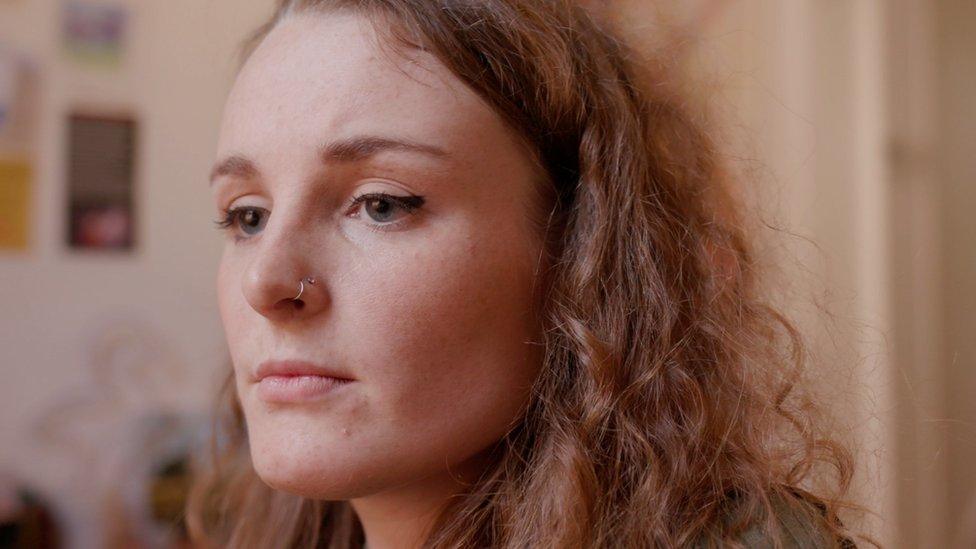University of Liverpool 'discriminating' over deadline extensions
- Published

Felicity and Kayley say they were charged £50 for a three-month extension
A UK university is accused of "disadvantaging disabled students" after charging for long-term assignment extensions due to medical needs.
One University of Liverpool student was unable to afford the £200 "tuition fee", and was locked out of her student account with "no access" to emails or documents for her dissertation.
She said the institution "had not been accommodating or sympathetic".
The university apologised and said it was reviewing its policy.
'Trying my hardest'
One postgraduate student, Felicity, told the BBC's Victoria Derbyshire programme she provided evidence from doctors to show the extension was required for medical reasons, meaning it was granted by the university as an "extenuating circumstance".
"I've not extended my studies because I want to have some more time to do my work. It's because I need it," she explained.
"It's the one thing that would have made my life easier, given all the health problems I've got.
"I'm trying my hardest to finish my work as it is - which has been pretty difficult."
The university's policy states that students face a fee for extending their studies into a new academic year, even if they need the extra time because of personal or medical reasons - also known as extenuating circumstances.
Felicity and fellow student Kayley - who have a range of mental and physical health conditions - were charged £50 for a three-month extension, which rose to £200 when they asked to extend further.
Felicity said she felt it could amount to discrimination, as such an extension could be considered "a reasonable adjustment," which has to be implemented under the Equality Act 2010.
The university said Felicity had "received a number of short-term coursework extensions as reasonable adjustments". It said Kayley was not registered as disabled with the university.
It added: "In line with university policy, a £50 tuition fee charge is applied for each three-month extension period, which covers access to study services as well as tuition and supervision.
"We are reviewing this policy."
Inaccessible rooms
The programme has also heard of wider issues surrounding disability support at the University of Liverpool.
Nana, who has cerebral palsy and uses a wheelchair, said her requirements were not always met.
She has been scheduled into inaccessible rooms "five or six" times.

Nana said in one lecture she was unable to see the lecturer due to frosted glass
And she added that when lecture theatres were accessible, "there tends to be something wrong with the rooms".
In one, it was not possible to see the lecturer due to frosted glass.
"That kind of speaks to how the wider society treats disabled people," she said, "because they hide them away and put them in a corner so you don't have to deal with them."
A recent Freedom of Information request revealed that only 57 out of more than 100 buildings, external at the University of Liverpool were fitted with general use lifts, meaning many are inaccessible for disabled students.
The University of Liverpool told the BBC: "We are sorry that Nana has experienced a number of occasions where rooms have not met her needs and sincerely apologise for the use of frosted glass in a designated space for wheelchair users. This has now been rectified."

Have a similar experience?
Get in touch with the BBC's Victoria Derbyshire programme by emailing victoria@bbc.co.uk.

For Julia, who has various health conditions that require additional support, including the hypermobility form of connective tissue disorder Ehlers-Danlos Syndrome (EDS), support from the university was "extremely inconsistent".
EDS causes her chronic pain, and even climbing stairs can cause her joints to partially or fully dislocate.
Her support plan says she is supposed to have an ergonomic chair, but this did not happen during her exams.
"It was physically a test of my pain tolerance, and not my academic ability."

Julia said her exams were a test of endurance
The chair she was given, she said, "did cause my hip to move and cause my sciatic pain and other muscular pain to shoot from my toes all the way to my neck".
She said it makes her more stressed about future assessments "because I know going into situations now that the support is probably not going to be there".
Despite having chronic fatigue syndrome and advice saying it should not happen, she said she was also scheduled to sit two exams in one day.
The university said it currently had more than 3,000 disabled students and worked hard to provide them with individual support.
Paul Redmond, director of student experience and enhancement, said: "Some of these accounts show that there are occasions where we have fallen short and we apologise sincerely where this has been the case.
"We will in future be involving disabled students more regularly in our reviews and decision-making processes to help ensure the high standards we aim for are consistently maintained."

Follow the BBC's Victoria Derbyshire programme on Facebook, external and Twitter, external - and see more of our stories here.
- Published3 November 2014

- Published17 April 2019

- Published16 January 2019
